2008年全国统一高考英语试卷(全国一卷)
- 格式:doc
- 大小:264.00 KB
- 文档页数:11
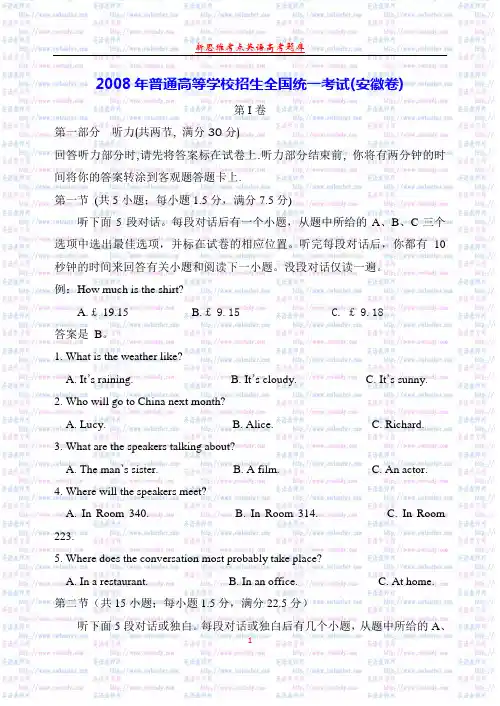
2008年普通高等学校招生全国统一考试(安徽卷)第I卷第一部分听力(共两节, 满分30分)回答听力部分时,请先将答案标在试卷上.听力部分结束前, 你将有两分钟的时间将你的答案转涂到客观题答题卡上.第一节(共5小题;每小题1.5分,满分7.5分)听下面5段对话。
每段对话后有一个小题,从题中所给的A、B、C三个选项中选出最佳选项,并标在试卷的相应位置。
听完每段对话后,你都有10秒钟的时间来回答有关小题和阅读下一小题。
没段对话仅读一遍。
例:How much is the shirt?A. £ 19.15B. £ 9.15C. £ 9.18答案是B。
1. What is the weather like?A. It’s raining.B. It’s cloudy.C. It’s sunny.2. Who will go to China next month?A. Lucy.B. Alice.C. Richard.3. What are the speakers talking about?A. The man’s sister.B. A film.C. An actor.4. Where will the speakers meet?A. In Room 340.B. In Room 314.C. In Room 223.5. Where does the conversation most probably take place?A. In a restaurant.B. In an office.C. At home.第二节(共15小题;每小题1.5分,满分22.5分)听下面5段对话或独白。
每段对话或独白后有几个小题,从题中所给的A、1B、C三个选项中选出最佳选项,并标在试卷的相应位置。
听每段对话或独白前,你将有时间阅读各个小题,每小题5秒钟;听完后,各小题将给出5秒钟的作答时间。
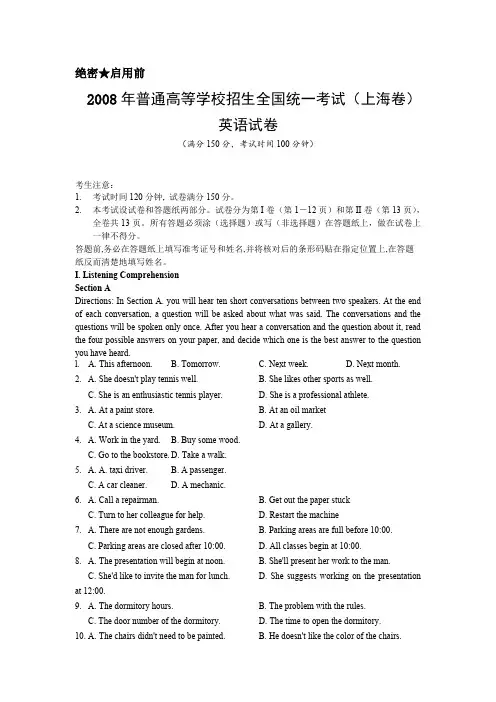
绝密★启用前2008年普通高等学校招生全国统一考试(上海卷)英语试卷(满分150分,考试时间100分钟)考生注意:1.考试时间120分钟, 试卷满分150分。
2.本考试设试卷和答题纸两部分。
试卷分为第I卷(第1-12页)和第II卷(第13页),全卷共13页。
所有答题必须涂(选择题)或写(非选择题)在答题纸上,做在试卷上一律不得分。
答题前,务必在答题纸上填写准考证号和姓名,并将核对后的条形码贴在指定位置上,在答题纸反而清楚地填写姓名。
I. Listening ComprehensionSection ADirections: In Section A. you will hear ten short conversations between two speakers. At the end of each conversation, a question will be asked about what was said. The conversations and the questions will be spoken only once. After you hear a conversation and the question about it, read the four possible answers on your paper, and decide which one is the best answer to the question you have heard.l. A. This afternoon. B. Tomorrow. C. Next week. D. Next month.2. A. She doesn't play tennis well. B. She likes other sports as well.C. She is an enthusiastic tennis player.D. She is a professional athlete.3. A. At a paint store. B. At an oil marketC. At a science museum.D. At a gallery.4. A. Work in the yard. B. Buy some wood.C. Go to the bookstore.D. Take a walk.5. A. A. taxi driver. B. A passenger.C. A car cleaner.D. A mechanic.6. A. Call a repairman. B. Get out the paper stuckC. Turn to her colleague for help.D. Restart the machine7. A. There are not enough gardens. B. Parking areas are full before 10:00.C. Parking areas are closed after 10:00.D. All classes begin at 10:00.8. A. The presentation will begin at noon. B. She'll present her work to the man.C. She'd like to invite the man for lunch.D. She suggests working on the presentation at 12:00.9. A. The dormitory hours. B. The problem with the rules.C. The door number of the dormitory.D. The time to open the dormitory.10. A. The chairs didn't need to be painted. B. He doesn't like the color of the chairs.C. The park could have avoided the problem.D. The woman should have been more careful.Section BDirections: In Section B. you will hear two short passages, and you will be asked three questions on each of the passages. The passages will be read twice, but the questions will be spoken only once. When you hear a question, read the four possible answers on your paper and decide which one would be the best answer to the question you have heard.Questions II through 13 are based on the following passage11. A. Worried. B. Surprised.C. Satisfied.D. Uninterested.12. A. It spoiled Juana's reputation. B. It copied her ideas without permission.C. It bought Juana's dishwashers.D. It wanted to share the dishwasher market.13. A. A successful business case. B. Juana's waterless laundry.C. A case against a global company.D. The worldwide dishwasher market. Questions 14 through 16 are based on the following instructions.14. A. footprints. B. Food. C. Living insects. D. Orange seeds.15. A. Don't touch animals under any circumstances.B. Don't take away any natural objects from the park.C. Don't leave litter in the park or throw any off the boat.D. Don't transport animals from one island to another.16. A. To protect the guide's interest. B. To improve the unique environment.C. To ensure a trouble-free visit.D. To get rid of illegal behaviours.Section CDirections: In Section C, you will bear two longer conversations. The conversations will be read twice. After you hear each conversation, you are required to fill in the numbered blanks with the information you have heard. Write your answers on your answer sheet.Complete the form. Write ONE WORD for each answer.Complete the form. Write NO MORE THAN THREE WORDS for each answer.II. Grammar and VocabularySection ADirections: Beneath each of the following sentences there are four choices marked A, B. C and D. Choose the one answer that best completes the sentence.25. The two sportsmen congratulated each other______ winning the match by shaking hands.A. withB. onC. inD. to26. — Do you want tea or coffee? —______. I really don't mind.A. NoneB. NeitherC. EitherD. All27. In my view, London's not as expensive in price as Tokyo but Tokyo is______ in traffic.A. the most organizedB. more organizedC. so organized asD. as organized as28. — Do you know if Terry will go camping this weekend?—Terry? Never! She______ tents and fresh air!A. has hatedB. hatedC. will hateD. bates29. According to the air traffic rules, you______ switch off your mobile phone before bearding.A. mayB. canC. wouldD. should30. My sister, an inexperienced rider, was found sitting on the bicycle______ to balance it.A. having triedB. tryingC. to tryD. tried31. — Are you ready for Spain?— Yes. 1 want the girls to experience that______ they are young.A. whileB. untilC. ifD. before32. In recent years many football clubs______ as business to make a profit.A. have runB. have been runC. had been runD. will run33. If there's a lot of work______. I'm happy to just keep on until it is finished.A. to doB. to be doingC. doneD. doing34. As his best friend. I can make accurate guesses about______ he will do or think.A. whatB. whichC. whomD. that35. Something as simple as______ some cold water may clear your mind and relieve pressure.A. to drinkB. drinkingC. to be drinkingD. drunk36. It has been proved______ eating vegetables in childhood helps to protect you against serious illnesses in later life.A. ifB. becauseC. whenD. that37. Ideally______ for Broadway theatres and Firth Avenue, the AVw York Park hotel is a favorite with many guests.A. locatingB. being locatedC. having been locatedD. located38. We went through a period______ communications were very difficult in the rural areas.A. whichB. whoseC. in whichD. with which39. So much of interest______ that most visitors simply run out of time before seeing it all.A. offers BeijingB. Beijing offersC. does Beijing offerD. Beijing does offer40. ______well prepared you are, you still need a lot of luck in mountain climbing.A. HoweverB. WhateverC. No matterD. AlthoughSection BDirections: Complete the following passage by using the words in the box. Each word can only beFrederick Douglass was an escaped slave in the movement that fought to end slavery in the United Stales. He became a 41 voce in the yean before the Civil War.A few weeks ago, the National Park Service (NPS) 42 Douglass's birth and Black History Month with the reopening of his home at Cedar Hill, a _43 site in Washington. D.C. The two-story house, which contains many of Douglass's personal possessions, had undergone a three-year 44 (Thanks to the NTS website, however, you don't have to live in the nation's capital to visit it. Take a tour online.)He was born Frederick Augustus Washington Bailey to a slave mother and a white father he never knew. Douglass grew up to become the first black _45 to bold a government office — as US minister and consul general (总领事) to Haiti.As a youth, he never went to school. Educating slaves was illegal in the South, so be 46 taught himself to read and write. At 21 years old, he escaped from his slave owner to Massachusetts and changed his last name to Douglass, to hide his identity.In the 1850s, Douglass was involved with the Underground Railroad, the system 47 up by antislavery groups to bring runaway slaves to the North and Canada. His home in Rochester, N.Y. was near the Canadian border. It became an important station on the 48 , housing as many as 11 runaway slaves at a time.He died in 1895. In his lifetime, Douglass witnessed the end of slavery in 1865 and the adoption of the 15th Amendment to the US Constitution (美国宪法修正案), which 49 African-Americans the right to vote.III. Reading ComprehensionSection ADirections: For each blank in the following passage there are four words or phrases marked A, B, C and D. Fill in each blank with the word or phrase that best fits the context.People think children should play sports. Sports are fun, and playing with others. However, playing sports can have __50 effects on children. It may produce feelings of poor self-respect oraggressive behavior in some children. According to research on kids and sports, 40,000,000 kids play sports in the US. Of these, 18,000,000 say they have been __51 at or called names while playing sports. This leaves many children with a bad __52 of sports. They think sports are just too aggressive.Many researchers believe adults, especially parents and coaches, are the main _53 of too much aggression ill children's sports. They believe children 54 aggressive adult behavior. This behavior is then further strengthened through both positive and negative feedback. Parents and coaches are powerful teachers because children usually look up to them. Often these adults behave aggressively themselves, sending children the message that__55 is everything. Many parents go to children's sporting events and shout 56 at other players or cheer when their child behaves 57 As well, children arc even taught that hurting other players is 58 or are pushed to continue playing even when they are injured 59 , the media makes violence seem exciting. Children watch adult sports games and see violent behavior replayed over and over on television.As a society, we really need to 60_this problem and do something about it. Parents and coaches 61 should act as better examples for children. They also need to teach children better 62 They should not just cheer when children win or act aggressively. They should teach children to 63 , themselves whether they win or not. Besides, children should not be allowed to continue to play when they are injured. If adults allow children to play when injured, this gives the message that __64 is not as important as winning.50. A. restrictive B. negative C. active D. instructive51. A. knocked B. glanced C. smiled D. shouted52. A. impression B. concept C. taste D. expectation53. A. resource B. cause C. course D. consequence54. A. question B. understand C. copy D. neglect55. A. winning B. practicing C. fun D. sport56. A. praises B. orders C. remarks D. insults57. A. proudly B. ambitiously C. aggressively D. bravely58. A. acceptable B. impolite C. possible D. accessible59. A. By contrast B. In addition C. As a result D. After all60. A. look up to B. face up to C. make up for D. come up with61. A. in particular B. in all C. in return D. in advance62. A. techniques B. means C. values D. directions63. A. respect B. relax C. forgive D. enjoy64. A. body B. fame C. health D. spiritSection BDirections: Read the following four passages. Each passage is followed by several questions or unfinished statements. For each of them there are four choices marked A, B, C and D. Choose the one that fits best according to the information given in the passage you have just read.(A)ASK LASKASYOU ’VE GOT QUESTIONS. SHE'S GOT ANSWERSMy children go to a primary school where they are notallowed to play football in the playground for fear that a childmight be hurt. Besides, now the school says there must be no homework because the localsecondary school can't keep up with the amount of homework given in the primary school. Can the school do this? Puzzled DadIt can't if enough parents do something about it. It is not just schools. We live in asociety which wishes to get rid of risk. However, schools should have a little commonsense and courage. Children need risk if they arc to grow up self-sufficient and confident.They need homework, too, if they are to fulfill their academic potential. Complain, loudly.I have a beautiful teenage daughter who spends an hour making up her face in frontof the mirror every day. I tell her to go easy. She just gets mad or bursts into tears. Howcan I make her understand she's beautiful the way she is. Plain MomYou can't. Your daughter is at the age when she's trying to look beautiful, trying onnew masks. And if her friends all dress up as she docs, you're in for an extra hard time.Support her and tell her she's beautiful — even if she looks ridiculous for now. Theninvite her to join you for a day at a spa (健康美容中心). Let her try various looks until she's comfortable in her own skin.65. Why are the children not allowed to play football in the playground? A. The school is afraid that children might be injured. B. The school is not sensible and confident.C. The children don't have enough time to do homework.D. The children may fail to fulfill their academic potential. 66. What disturbs Plain Mom is that her daughter______.A. becomes madB. cries a lotC. spends much rime before the mirrorD. is not beautiful enough67. The solution to Plain Mom's problem is to______.A. make her daughter look less ridiculousB. let her daughter dress up like her friendsC. make her daughter go to a spa every weekD. let her daughter feel herself what beauty is(B)Zoe Chambers was a successful PR (Public Relations) consultant and life was going well — she had a great job, a beautiful flat and a busy social life in London. Then one evening in June lastyear, she received a text message telling her she was out of work. The first two weeks were themost difficult to live through." she said. "After everything I'd done for the company, they dismissed me by text! I was so angry and I just didn't feel like looking for another job. I hated everything about the city and my life."Then, Zoe received an invitation from an old school friend, Kathy, to come and stay. Kathy and her husband, Huw, had just bought a farm in north-west Wales. Zoe jumped at the chance to spend a weekend away from London, and now, ten months later, she is still on the farm."The moment I arrived at Kathy's farm, I loved it and I knew I wanted to stay." said Zoe. "Everything about my past life suddenly seemed meaningless."Zoe has been working on the farm since October of last year and says she has no regrets. "It's a hard life, physically very tiring." she says. "In London 1 was stressed and often mentally exhausted. But this is a good, healthy tiredness. Here, all 1 need to put me in a good mood is a hot bath and one of Kathy's wonderful dinners."Zoe says she has never felt bored on the farm. Every day brings a new experience. Kathy has been leaching her how to ride a horse and she has learnt to drive a tractor. Since Christmas, she has been helping with the lambing — watching a lamb being born is unbelievable, she says, "It's one of the most moving experiences I've ever had. I could never go back to city life now."68. When working as a PR consultant in London, Zoe thought she lived a______ life.A. satisfyingB. toughC. meaninglessD. boring69. The most important reason why Zoe went to visit Kathy's farm is that______.A. Zoe lost her job as a PR consultantB. Kathy persuaded her to do soC. Zoe got tired of the city lifeD. Zoe loved Wales more than London70. How docs Zoe feel about the country life according to the passage?A. Tiresome and troublesome.B. Romantic and peacefulC. Mentally exhausting but healthyD. Physically tiring but rewarding.71. Which of the following is closest to the main idea of the passage?A. A friend in need is a friend indeed.B. Where there is a will, there is a way.C. A misfortune may turn out a blessing.D. Kill two birds with one stone.(C)A study involving 8,500 teenagers from all social backgrounds found that most of them are ignorant when it comes to money. The findings, the first in a series of reports from NatWest that has started a five-year research project into teenagers and money, arc particularly worrying as this generation of young people is likely to be burdened with greater debts man any before.University tuition fees (学费)are currently capped at £3,000 annually, but this will be reviewed next year and the Government is under enormous pressure to raise the ceiling.In the research, the teenagers were presented with die terms of four different loans but 76 per cent failed to identify the cheapest. The young people also predicted that they would be earning on average £31.000 by the age of 25, although the average salary for those aged 22 to 29 is just £ 17,815. The teenagers expected to be in debt when they finished university or training, althoughhalf said that they assumed the debts would be less than £ 10000. Average debts for graduates are £ 12,363.Stephen Moir, head of community investment at the Royal Bank of Scotland Group which owns NatWest, said. "The more exposed young people are to financial issues, and the younger they become aware of them, the more likely they arc to become responsible, forward-planning adults who manage their finances confidently and effectively."Ministers are deeply concerned about the financial pressures on teenagers and young people because of student loans and rising housing costs. They have just introduced new lessons in how to manage debts. Nikki Fairweather, aged 15 from St Helens, said that she had benefited from lessons on personal finance, but admitted that she still had a lot to learn about money.72. Which of the following can be found from the five-year research project?A. Students understand personal finances differently.B. University tuition fees in England have been rising.C. Teenagers tend to overestimate their future earnings.D. The students' payback ability has become a major issue.73. The phrase "to raise the ceiling" in paragraph 2 probably means "______".A. to raise the student loansB. to improve the school facilitiesC. to increase the upper limit of the tuitionD. to lift the school building roofs74. According to Stephen Moir, students_______.A. are too young 10 be exposed 10 financial issuesB. should learn 10 manage their finances wellC- should maintain a positive attitude when facing loansD. benefit a lot from lessons on personal finance75. What can we learn from the passage?A. Many British teenagers do not know money matters wellB. Teenagers in Britain are heavily burdened with debts.C. Financial planning is a required course at college.D. Young people should become responsible adults.(D)The world economy has run into a brick wall. Despite countless warnings in recent years about the need to address a potential hunger crisis in poor countries and an energy crisis worldwide, world leaders failed to think ahead. The result is a global food crisis. Wheat, corn and rice prices have more than doubled in the past two years. And oil prices have increased more than three times since the start of 2004. These food-price increases, combined with increasing energy costs, will slow if not stop economic growth in many parts of the world and will even affect political stability. Practical solutions to these problems do exist, but we'll have to start thinking ahead and acting globally.Here are three steps to ease the current food crisis and avoid the potential for a global crisis.The first is to promote the dramatic success of Malawi, a country in southern Africa, which three years ago established a special fund to help its farmers get fertilizer and seeds with high productivity. Malawi’s harvest doubled after just one year. An international fund based on the Malawi model would cost a mere $10 per person annually in the rich world, or S10 billion altogether.Second, the U.S. and Europe should abandon their policies of paying partly for the change of food into biofuels. The U.S. government gives farmers a taxpayer-financed payment of 51 cents per gallon of ethanol (乙醇) changed from corn. There may be a case for biofuels produced on lands that do not produce foods — tree crops, grasses and wood products — but there's no case for the government to pay to put the world's dinner into the gas tank.Third, we urgently need to weather-proof die world's crops as soon and as effectively as possible. For a poor farmer, sometimes something as simple as a farm pond —which collects rainwater to be used in dry weather — can make the difference between a good harvest and a bad one. The world has already committed to establishing a Climate Adaptation hind to help poor regions climate-proof vital economic activities such as food production and health care but has not yet acted upon the promise.76. An international fund based on the Malawi model would______.A. cost each of the developed countries $10 billion per yearB. aim to double the harvest in southern African countries In a yearC. decrease the food prices as well as the energy pricesD. give poor farmers access to fertilizer and highly productive seeds77. With the second step, the author expresses the idea that ______.A. it is not wise to change food crops into gasB. it is misleading to put tree crops into the gas tankC. we should get alternative forms of fuel in any wayD. biofuels should be developed on a large scale78. Which of the following is true according to the passage?A. A rain-collecting pond is a simple safeguard against dry wealB. A Climate Adaptation Fund has been established to help poorC. The world has made a serious promise to build farm ponds.D. It makes a great difference whether we develop wood products or not.79. In the passage, the author calls on us to______.A. slow down but not to stop economic.B. develop tree crops, grasses and wood productsC. achieve economic growth and political stabilityD. act now so as to relieve the global food shortageSection CDirections: Read the following text and choose the most suitable heading from A-F for each80.some cases. There may be psychological problems from early childhood or the present (such as school or family conflicts) that trigger the problem. Often, there is the double pressure to enjoy life through food and yet remain ultra-slim. Society all around us encourages eating and drinking as main ways to enjoy life- To be popular, you are supposed to eat, eat, eat.81. more weight They then find themselves in conflict with another dominant pressure in society — to stay slim and trim. Models in ads, even those shown earing fairy foods, are usually physically lit and quite thin. All of these pressures put teens in a terrible situation. The ".solution" that some teens choose is to deny themselves all the time so as to keep temptation away. Bui soon, hunger and food boredom lead to overeating. Over time they develop anorexia or ballerina.82. never suffered anorexia and never known an anorexic might be tempted to think. "It's simple — just tell them to eat more!" Unfortunately, it's not that simple. Even when anorexics have been brought into the hospital and arc receiving physical care, nutritional therapy, and psychiatric care, many don't improve much.83. rich food means pleasure, puts many teens in a difficult situation. Being drawn to overeating on the one hand and self-denial on the other can bring about anorexia or bulimia — or both. Anorexics seem to feel that no matter how much weight they lose, they are still too fat Therefore, it is important for each person in our society to try to maintain a healthy and realistic self-image. Don't compare yourself with the models and actors in the media. Set your sights more realistically by comparing yourself with family and friends, if anyone.84. desires for what you've denied yourself become unbearable, and you react with either a binge or overly fierce self-control. The answer is not of course. 10 eat all the snacks and trace you fancy. But 10 avoidthat first step that leads to overeating, strive for a good and healthy diet. Such a diet is based primarily on grain products, fruits, and vegetables, with moderate amounts of meat and dairy products and with small amounts of snacks and desserts. Research demonstrates that miss kind of diet leaves you more alert and energetic.TranslationDirections: Translate the following sentences into English, using the words given in the brackets.1. 我们打篮球的时间到了。
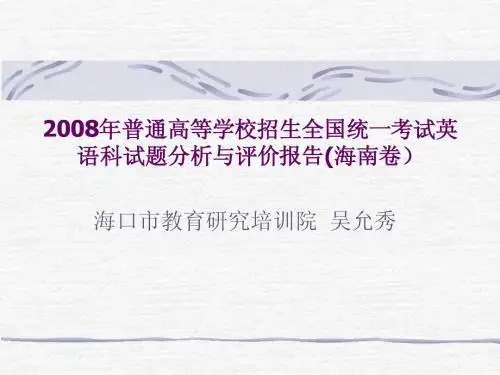
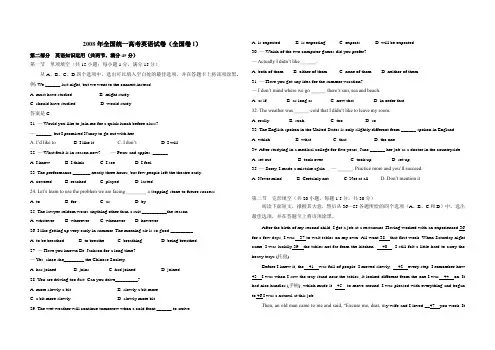
2008年全国统一高考英语试卷(全国卷I)第二部分英语知识运用(共两节,满分45分)第一节单项填空(共15小题;每小题1分,满分15分)从A、B、C、D四个选项中,选出可以填入空白处的最佳选项,并在答题卡上将该项涂黑。
例: We ______ last night, but we went to the concert instead.A. must have studiedB. might studyC. should have studiedD. would study答案是C.21. — Would you like to join me for a quick lunch before class?— ______, but I promised Nancy to go out with her.A. I’d like toB. I like it.C. I don’tD. I will22. — What fruit is in season now? — Pears and apples, ______.A. I knowB. I thinkC. I seeD. I feel23. The performance _______ nearly three hours, but few people left the theatre early.A. coveredB. reachedC. playedD. lasted24. Let’s learn to use the problem we are facing ________ a s tepping-stone to future success.A. toB. forC. asD. by25. The lawyer seldom wears anything other than a suit __________the season.A. whateverB. whereverC. wheneverD. however26. I like getting up very early in summer. The morning air is so good _________.A. to be breathedB. to breatheC. breathingD. being breathed27. — Have you known Dr. Jackson for a long time?— Yes, since she________ the Chinese Society.A. has joinedB. joinsC. had joinedD. joined28. You are driving too fast. Can you drive_________?A. more slowly a bitB. slowly a bit moreC. a bit more slowlyD. slowly more bit29. The wet weather will continue tomorrow when a cold front ______ to arrive. A. is expected B. is expecting C. expects D. will be expected30. — Which of the two computer games did you prefer?—Actually I didn’t like ______.A. both of themB. either of themC. none of themD. neither of them31. — Have you got any idea for the summer vacation?—I don’t mind where we go ______ there’s sun, sea and beach.A. as ifB. as long asC. now thatD. in order that32. The weather was ______ cold that I didn’t like to leave my room.A. reallyB. suchC. tooD. so33. The English spoken in the United States is only slightly different from ______ spoken in England.A. whichB. whatC. thatD. the one34. After studying in a medical college for five years, Jane ______ her job as a doctor in the countryside.A. set outB. took overC. took upD. set up35. — Sorry, I made a mistake again. —______. Practice more and you’ll succeed.A. Never mindB. Certainly notC. Not at allD. Don’t mention it第二节完形填空(共20小题,每题1.5分,共30分)阅读下面短文,撑握其大意,然后从36—55各题所给的四个选项(A、B、C和D)中,选出最佳选项,并在答题卡上将该项涂黑。
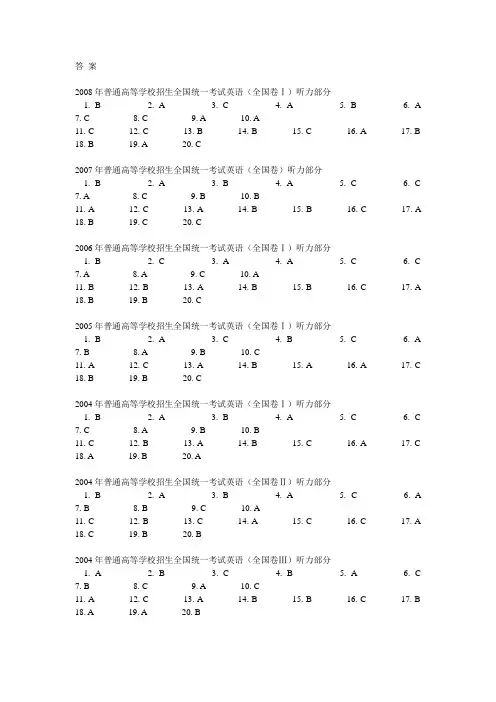
答案2008年普通高等学校招生全国统一考试英语(全国卷Ⅰ)听力部分1. B2. A3. C4. A5. B6. A7. C8. C9. A 10. A11. C 12. C 13. B 14. B 15. C 16. A 17. B 18. B 19. A 20. C2007年普通高等学校招生全国统一考试英语(全国卷)听力部分1. B2. A3. B4. A5. C6. C7. A8. C9. B 10. B11. A 12. C 13. A 14. B 15. B 16. C 17. A 18. B 19. C 20. C2006年普通高等学校招生全国统一考试英语(全国卷Ⅰ)听力部分1. B2. C3. A4. A5. C6. C7. A8. A9. C 10. A11. B 12. B 13. A 14. B 15. B 16. C 17. A 18. B 19. B 20. C2005年普通高等学校招生全国统一考试英语(全国卷Ⅰ)听力部分1. B2. A3. C4. B5. C6. A7. B8. A9. B 10. C11. A 12. C 13. A 14. B 15. A 16. A 17. C 18. B 19. B 20. C2004年普通高等学校招生全国统一考试英语(全国卷Ⅰ)听力部分1. B2. A3. B4. A5. C6. C7. C8. A9. B 10. B11. C 12. B 13. A 14. B 15. C 16. A 17. C 18. A 19. B 20. A2004年普通高等学校招生全国统一考试英语(全国卷Ⅱ)听力部分1. B2. A3. B4. A5. C6. A7. B8. B9. C 10. A11. C 12. B 13. C 14. A 15. C 16. C 17. A 18. C 19. B 20. B2004年普通高等学校招生全国统一考试英语(全国卷Ⅲ)听力部分1. A2. B3. C4. B5. A6. C7. B8. C9. A 10. C11. A 12. C 13. A 14. B 15. B 16. C 17. B 18. A 19. A 20. B2004年普通高等学校招生全国统一考试英语(全国卷Ⅳ)听力部分1. C2. C3. A4. B5. B6. A7. C8. B9. A 10. C11. B 12. A 13. C 14. A 15. C 16. B 17. B 18. A 19. C 20. B2003年普通高等学校招生全国统一考试英语(全国卷)听力部分1. A2. B3. C4. B5. C6. C7. B8. A9. C 10. A11. C 12. A 13. B 14. A 15. C 16. B 17. C 18. A 19. B 20. C2002年普通高等学校招生全国统一考试英语(全国卷)听力部分1. C2. A3. B4. B5. C6. B7. A8. C9. B 10. A11. C 12. A 13. B 14. C 15. B 16. C 17. A 18. C 19. B 20.C2001年普通高等学校招生全国统一考试英语(全国卷)听力部分1. C2. A3. C4. B5. A6. B7. A8. C9. B 10. A11. B 12. C 13. B 14. A 15. C 16. A 17. B 18. A 19. C 20. B2001年普通高等学校招生全国统一考试英语(上海卷)听力部分1. A2. C3. B4. A5. C6. D7. B8. C9. D 10. A11. D 12. B 13. A 14. C 15. B 16. D 17. A 18. A 19. B 20. C2000年普通高等学校招生全国统一考试英语(全国卷)听力部分1. A2. B3. B4. C5. B6. A7. A8. C9. C 10. A11. B 12. A 13. C 14. B 15. C 16. C 17. A 18. B 19. A 20. C1999年普通高等学校招生全国统一考试英语(全国卷)听力部分1. B2. A3. C4. C5. B6. B7. A8. A9. C 10. B11. A 12. C 13. B 14. B 15. A 16. C 17. C 18. A 19. B 20. C。
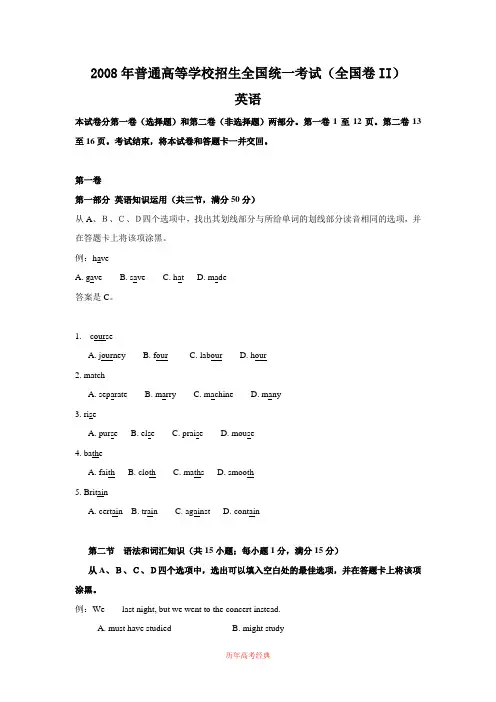
2008年普通高等学校招生全国统一考试(全国卷II)英语本试卷分第一卷(选择题)和第二卷(非选择题)两部分。
第一卷1至12页。
第二卷13至16页。
考试结束,将本试卷和答题卡一并交回。
第一卷第一部分英语知识运用(共三节,满分50分)从A、B、C、D四个选项中,找出其划线部分与所给单词的划线部分读音相同的选项,并在答题卡上将该项涂黑。
例:haveA. gaveB. saveC. hatD. made答案是C。
1.courseA. journeyB. fourC. labourD. hour2. matchA. separateB. marryC. machineD. many3. riseA. purseB. elseC. praiseD. mouse4. batheA. faithB. clothC. mathsD. smooth5. BritainA. certainB. trainC. againstD. contain第二节语法和词汇知识(共15小题;每小题1分,满分15分)从A、B、C、D四个选项中,选出可以填入空白处的最佳选项,并在答题卡上将该项涂黑。
例:We ___ last night, but we went to the concert instead.A. must have studiedB. might studyC. should have studiedD. would study答案是C。
6. –Do you know A nna’s telephone number?-- ____. As a matter of fact, I don’t know any Anna, either.A. I think soB. I’m afraid notC. I hope soD. I’d rather not7. A small car is big enough for a family of three ____ you need more space for baggage.A. onceB. becauseC. ifD. unless8. It’s not ___ good idea to drive for four hours without ___ break.A. a ; aB. the ; aC. the ; theD. a ; the9. – What are you reading, Tom?–I’m not really reading, just ___ the pages.A. turning offB. turning aroundC. turning overD. turning up10. -- Could I ask you a rather personal question?-- Sure, ____.A. pardon meB. go aheadC. good ideaD. forget it11. If the weather had been better, we could have had a picnic. But it ____ all day.A. rainedB. rainsC. has rainedD. is raining12. The director had her assistant ___ some hot dogs for the meeting.A. picked upB. picks upC. pick upD. picking up13. Stand over there ___ you’ll be able to see the oil painting bet ter.A. butB. tillC. andD. or14. If their marketing plans succeed, they ____ their sales by 20 percent.A. will increaseB. have been increasingC. have increasedD. would be increasing15. Modern equipment and no smoking are two of the things I like ____ working here.A. withB. overC. atD. about16. The road conditions there turned out to be very good, ___ was more than we could expect.A. itB. whatC. whichD. that17. Liza ___ well not want to go on the trip --- she hates traveling.A. willB. canC. mustD. may18. Little Johnny felt the bag, curious to know what it ____.A. collectedB. containedC. loadedD. saved19. The house still needed a lot of work, but ___ the kitchen was finished.A. insteadB. altogetherC. at onceD. at least20. It was in New Zealand ___ Elizabeth first met Mr. Smith.A. thatB. howC. whichD. when第三节完形填空(共20小题;每小题1.5分,满分30分)阅读下面短文,从短文后各题所给的四个选项(A、B、C和D)中,选出可以填入空白处的最佳选项,并在答题卡上将该选项涂黑。
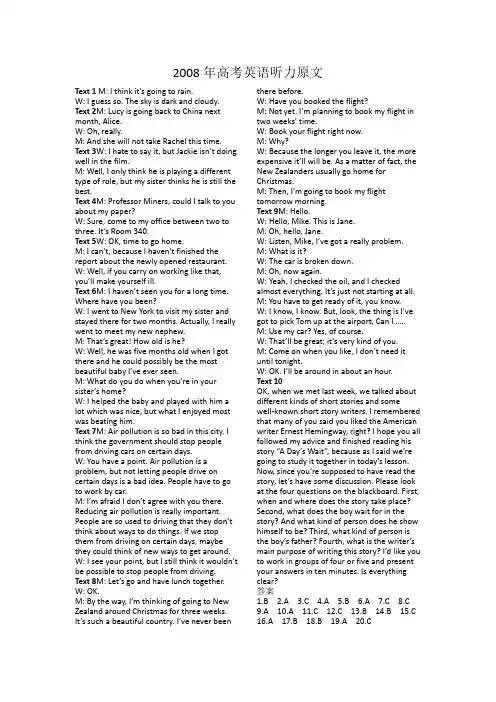
2008年高考英语听力原文Text 1 M: I think it’s going to rain.W: I guess so. The sky is dark and cloudy. Text 2M: Lucy is going back to China next month, Alice.W: Oh, really.M: And she will not take Rachel this time. Text 3W: I hate to say it, but Jackie isn’t do ing well in the film.M: Well, I only think he is playing a different type of role, but my sister thinks he is still the best.Text 4M: Professor Miners, could I talk to you about my paper?W: Sure, come to my office between two to three. It’s Room 340.Text 5W: OK, time to go home.M: I can’t, because I haven’t finished the report about the newly opened restaurant. W: Well, if you carry on working like that, you’ll make yourself ill.Text 6M: I haven’t seen you for a long time. Where have you been?W: I went to New York to visit my sister and stayed there for two months. Actually, I really went to meet my new nephew.M: That’s great! How old is he?W: Well, he was five months old when I got there and he could possibly be the most beautiful baby I’ve ever se en.M: What do you do when you’re in your sister’s home?W: I helped the baby and played with him a lot which was nice, but what I enjoyed most was beating him.Text 7M: Air pollution is so bad in this city. I think the government should stop people from driving cars on certain days.W: You have a point. Air pollution is a problem, but not letting people drive on certain days is a bad idea. People have to go to work by car.M: I’m afraid I don’t agree with you there. Reducing air pollution is really important. People are so used to driving that they don’t think about ways to do things. If we stop them from driving on certain days, maybe they could think of new ways to get around. W: I see your point, but I still think it wouldn’t be possible to stop people from driving. Text 8M: Let’s go and have lunch together. W: OK.M: By the way, I’m thinking of going to New Zealand around Christmas for three weeks. It’s such a beautiful country. I’ve never been there before.W: Have you booked the flight?M: Not yet. I’m planning to book my flight in two weeks’ time.W: Book your flight right now.M: Why?W: Because the longer you leave it, the more expensive it’ll will be. As a matter of fact, the New Zealanders usually go home for Christmas.M: Then, I’m going to book my flight tomorrow morning.Text 9M: Hello.W: Hello, Mike. This is Jane.M: Oh, hello, Jane.W: Listen, Mike, I’ve got a really problem. M: What is it?W: The car is broken down.M: Oh, now again.W: Yeah, I checked the oil, and I checked almost everythin g. It’s just not starting at all. M: You have to get ready of it, you know. W: I know, I know. But, look, the thing is I’ve got to pick Tom up at the airport, Can I ….. M: Use my car? Yes, of course.W: That’ll be great; it’s very kind of you.M: Come on w hen you like, I don’t need it until tonight.W: OK. I’ll be around in about an hour.Text 10OK, when we met last week, we talked about different kinds of short stories and somewell-known short story writers. I remembered that many of you said you liked the American writer Ernest Hemingway, right? I hope you all followed my advice and finished reading his story “A Day’s Wait”, because as I said we’re going to study it together in today’s lesson. Now, since you’re supposed to have read the story, let’s have some discussion. Please look at the four questions on the blackboard. First, when and where does the story take place? Second, what does the boy wait for in the story? And what kind of person does he show himself to be? Third, what kind of person is the b oy’s father? Fourth, what is the writer’s main purpose of writing this story? I’d like you to work in groups of four or five and present your answers in ten minutes. Is everything clear?答案1.B2.A3.C4.A5.B6.A7.C8.C9.A 10.A 11.C 12.C 13.B 14.B 15.C 16.A 17.B 18.B 19.A 20.C。
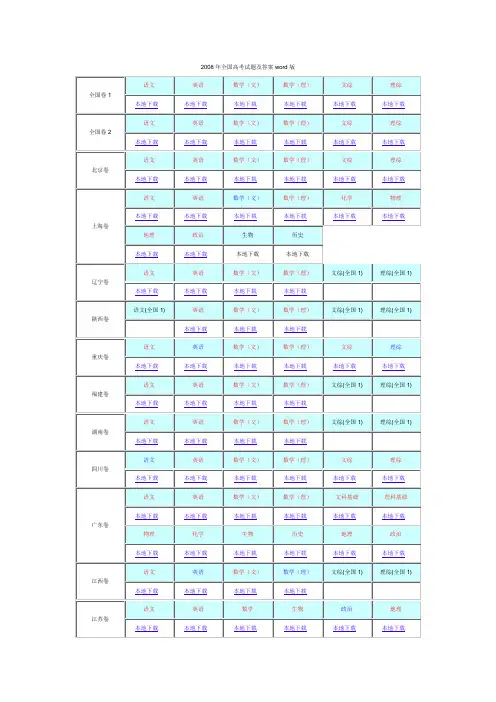
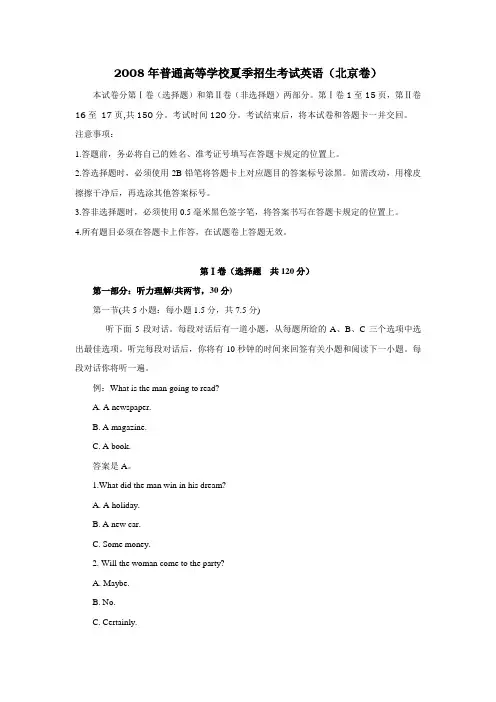
2008年普通高等学校夏季招生考试英语(北京卷)本试卷分第Ⅰ卷(选择题)和第Ⅱ卷(非选择题)两部分。
第Ⅰ卷1至15页,第Ⅱ卷16至17页,共150分。
考试时间120分。
考试结束后,将本试卷和答题卡一并交回。
注意事项:1.答题前,务必将自己的姓名、准考证号填写在答题卡规定的位置上。
2.答选择题时,必须使用2B铅笔将答题卡上对应题目的答案标号涂黑。
如需改动,用橡皮擦擦干净后,再选涂其他答案标号。
3.答非选择题时,必须使用0.5毫米黑色签字笔,将答案书写在答题卡规定的位置上。
4.所有题目必须在答题卡上作答,在试题卷上答题无效。
第Ⅰ卷(选择题共120分)第一部分:听力理解(共两节,30分)第一节(共5小题:每小题1.5分,共7.5分)听下面5段对话。
每段对话后有一道小题,从每题所给的A、B、C三个选项中选出最佳选项。
听完每段对话后,你将有10秒钟的时间来回签有关小题和阅读下一小题。
每段对话你将听一遍。
例:What is the man going to read?A. A newspaper.B. A magazine.C. A book.答案是A。
1.What did the man win in his dream?A. A holiday.B. A new car.C. Some money.2. Will the woman come to the party?A. Maybe.B. No.C. Certainly.3. How long has the woman been an author?A. About 30 years.B. About 40 years.C. About 70 years.4. What does the woman want?A. A radio.B. Some pens.C. Some batteries.5. What is the woman doing?A. Asking for information.B. Asking for an apology.C. Asking for help.第二节(共15小题;每小题1.5分,共22.5分)听下面6段对话或独白。
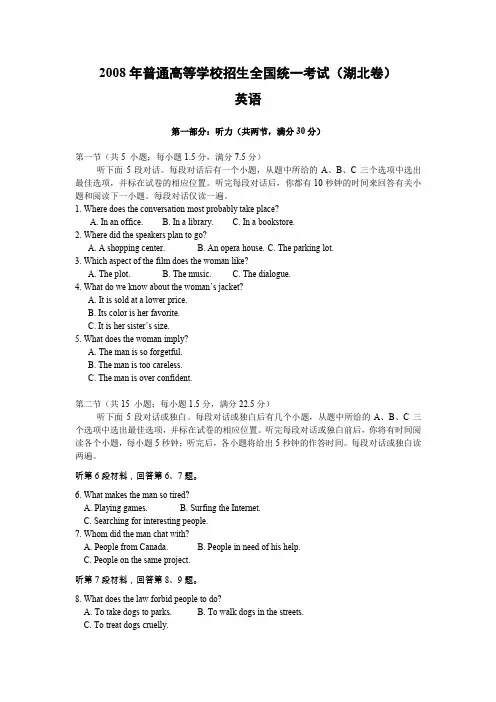
2008年普通高等学校招生全国统一考试(湖北卷)英语第一部分:听力(共两节,满分30分)第一节(共5 小题;每小题1.5分,满分7.5分)听下面5段对话。
每段对话后有一个小题,从题中所给的A、B、C三个选项中选出最佳选项,并标在试卷的相应位置。
听完每段对话后,你都有10秒钟的时间来回答有关小题和阅读下一小题。
每段对话仅读一遍。
1. Where does the conversation most probably take place?A. In an office.B. In a library.C. In a bookstore.2. Where did the speakers plan to go?A. A shopping center.B. An opera house.C. The parking lot.3. Which aspect of the film does the woman like?A. The plot.B. The music.C. The dialogue.4. What do we know about the woman’s jacket?A. It is sold at a lower price.B. Its color is her favorite.C. It is her sister’s size.5. What does the woman imply?A. The man is so forgetful.B. The man is too careless.C. The man is over confident.第二节(共15 小题;每小题1.5分,满分22.5分)听下面5段对话或独白。
每段对话或独白后有几个小题,从题中所给的A、B、C三个选项中选出最佳选项,并标在试卷的相应位置。
听完每段对话或独白前后,你将有时间阅读各个小题,每小题5秒钟;听完后,各小题将给出5秒钟的作答时间。
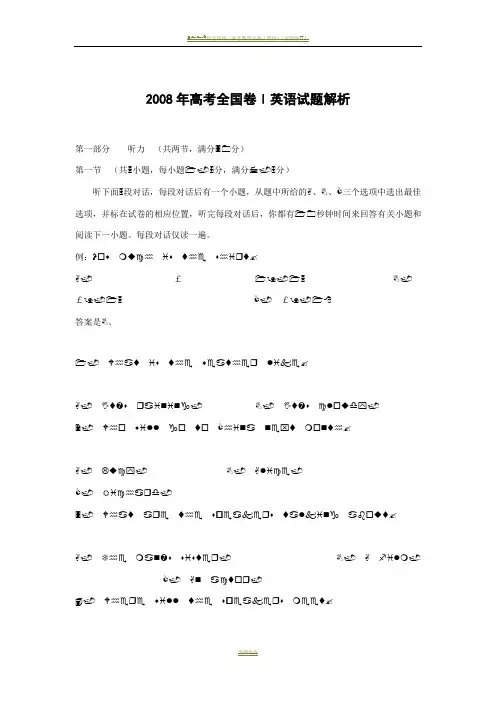
2008年高考全国卷Ⅰ英语试题解析第一部分 听力 (共两节,满分 分)第一节 (共 小题,每小题 分,满分 分)听下面 段对话,每段对话后有一个小题,从题中所给的✌、 、 三个选项中选出最佳选项,并标在试卷的相应位置,听完每段对话后,你都有 秒钟时间来回答有关小题和阅读下一小题。
每段对话仅读一遍。
例:☟☐♦ ❍◆♍♒ ♓♦ ♦♒♏ ♦♒♓❒♦✍✌ £ £ £ 答案是 。
♒♋♦ ♓♦ ♦♒♏ ♦♏♋♦♒♏❒ ●♓♏✍✌ ✋♦❼♦ ❒♋♓⏹♓⏹♑ ✋♦❼♦ ♍●☐◆♎⍓ ♒☐ ♦♓●● ♑☐ ♦☐ ♒♓⏹♋ ⏹♏⌧♦ ❍☐⏹♦♒✍✌ ☹◆♍⍓ ✌●♓♍♏ ♓♍♒♋❒♎ ♒♋♦ ♋❒♏ ♦♒♏ ♦☐♏♋♏❒♦ ♦♋●♓⏹♑ ♋♌☐◆♦✍✌ ❆♒♏ ❍♋⏹❼♦ ♦♓♦♦♏❒ ✌ ♐♓●❍ ✌⏹ ♋♍♦☐❒ ♒♏❒♏ ♦♓●● ♦♒♏ ♦☐♏♋♏❒♦ ❍♏♏♦✍✌ ✋⏹ ☐☐❍ ✋⏹ ☐☐❍ ✋⏹ ☐☐❍ ♒♏❒♏ ♎☐♏♦ ♦♒♏ ♍☐⏹❖♏❒♦♋♦♓☐⏹ ❍☐♦♦ ☐❒☐♌♋♌●⍓ ♦♋♏ ☐●♋♍♏?✌ ✋⏹ ♋ ❒♏♦♦♋◆❒♋⏹♦ ✋⏹ ♋⏹ ☐♐♐♓♍♏ ✌♦ ♒☐❍♏第二节 (共 小题;每小题 分,满分 分)听下面 段对话或独白,每段对话或独白后面有几个小题,从题中所给的✌、 、 三个选项中选出最佳选项,并标在试卷的相应位置。
听每段对话或独白前,你将有时间阅读各小题,每小题 秒钟;听完后,各小题将给出 秒钟的作答时间。
每段对话或独白读两遍。
听第 段材料,回答第 至 题。
♒⍓ ♎♓♎ ♦♒♏ ♦☐❍♋⏹ ♑☐ ♦☐ ☠♏♦ ✡☐❒✍✌ ❆☐ ♦☐♏⏹♎ ♦☐❍♏ ♦♓❍♏ ♦♓♦♒ ♦♒♏ ♌♋♌⍓ ❆☐ ●☐☐ ♋♐♦♏❒ ♒♏❒ ♦♓♦♦♏❒ ❆☐ ♐♓⏹♎ ♋ ⏹♏♦ ☐♌ ☟☐♦ ☐●♎ ♦♋♦ ♦♒♏ ♌♋♌⍓ ♦♒♏⏹ ♦♒♏ ♦☐❍♋⏹ ●♏♐♦ ☠♏♦ ✡☐❒✍✌ ❆♦☐ ❍☐⏹♦♒♦ ☞♓❖♏ ❍☐⏹♦♒♦ ♏❖♏⏹ ❍☐⏹♦♒♦ ♒♋♦ ♎♓♎ ♦♒♏ ♦☐❍♋⏹ ●♓♏ ♎☐♓⏹♑ ❍☐♦♦ ♦♓♦♒ ♦♒♏ ♌♋♌⍓✍✌ ☟☐●♎♓⏹♑ ♒♓❍ ●♋⍓♓⏹♑ ♦♓♦♒ ♒♓❍ ☞♏♏♎♓⏹♑ ♒♓❍听第 段材料,回答第 至 题。
2008年普通高等学校招生全国统一考试(安徽卷)英语本试卷分第工卷(选择题)和第U卷(非选择题)两部分。
共150分,考试时间l20分钟。
第1卷(选择题共ll5分)第一部分听力(共两节,满分30分)第一节(共5小题;每小题l.5分。
满分7.5分)听下面5段对话。
每段对话后有一个小题,从题中所给的A、B、C三个选项中选出最佳选项。
听完每段对话后,你都有10秒钟的时间来回答有关小题和阅读下一小题。
每段对话仅读一遍。
1. What is the weather like?A. It's raining.B. It's cloudy.C. It's sunny.2. Who will go to China next month? .A. Lucy.B. Alice.C. Richard.3, What are the speakers talking about?A. The man's sister.B. A film.C. An actor4. where will the speakers meet?A. In Room 340.B. In Room 314.C. In Room 223.5. Where does the conversation most probably take place?A. In a restaurant.B. In an office.C. At home.第二节(共l5小题;每小题l.5分。
满分22.5分) 。
听下面5段对话或独白。
每段对话或独自后有几个小题,从题中所给的A、B、C三个选项中选出最佳选项。
听每段对话或独白前,你将有时间阅读各个小题,每小题5秒钟;听完后,各小题将给出5秒钟的作答时间。
每段对话或独自读两遍。
’听第6段材料,回答第6至8题。
6. Why did the woman go to New York?A. To spend some time with the baby.B. To look after her sister.C. To find a new job.7. How old was the baby When the woman left New York?A. Two months.B. Five months. Seven months.8. What did the woman like doing most with the baby?A. Holding him.B. Playing with him.C. Feeding him.听第7段材料,回答第9至11题。
2008年普通高等学校招生全国统一考试(全国卷I)第一部分听力(共两节,满分30分)第一节(共5小题,每小题1.5分,满分7.5分)听下面5段对话,每段对话后有一个小题,从题中所给的A、B、C三个选项中选出最佳选项,并标在试卷的相应位置,听完每段对话后,你都有10秒钟时间来回答有关小题和阅读下一小题。
每段对话仅读一遍。
例:How much is the shirt?A. £19.15B. £9.15C. £9.18答案是B。
1. What is the weather like?A. It’s raining.B. It’s cloudy.2. Who will go to China next month?A. Lucy.B. Alice.C. Richard.3. What are the speakers talking about?A. The man’s sister.B. A film.C. An actor.4. Where will the speakers meet?A. In Room 340.B. In Room 314.C. In Room 223.5. Where does the conversation most probably take place?A. In a restaurant.B. In an office.C. At home.第二节(共15小题;每小题1.5分,满分22.5分)听下面5段对话或独白,每段对话或独白后面有几个小题,从题中所给的A、B、C三个选项中选出最佳选项,并标在试卷的相应位置。
听每段对话或独白前,你将有时间阅读各小题,每小题5秒钟;听完后,各小题将给出5秒钟的作答时间。
每段对话或独白读两遍。
听第6段材料,回答第6至8题。
6. Why did the woman go to New York?A. To spend some time with the baby.B. To look after her sister.C. To find a new job.7. How old was the baby when the woman left New York?A. Two months.B. Five months.C. Seven months.8. What did the woman like doing most with the baby?A. Holding him.B. Playing with him.C. Feeding him.听第7段材料,回答第9至11题。
2008年普通高等学校招生全国统一考试(福建卷)英语第I卷(选择题共115分)第一部分听力(共两节,满分30分)做题时,先将答案标在试卷上。
录音内容结束后,你将有两分钟的时间将试卷上的答案转涂到答题卡上。
第一节(共5小题;每小题1.5分,满分7.5分)听下面5段对话。
第段对话后有一个小题,从题中所给的A、B、C三个选项中选出最佳选项,并标在试卷的相应位置。
听完每段对话后,你都有10秒钟的时间来回答有关小题和阅读下一小题。
每段对话仅读一遍。
例:How much is the ehirt?A.£ 19.15B. £ 9.15C. £ 9.18答案是B。
1.What is the weather like?A.It’s raining.B.It’s cloudy.C.It’s sunny.2.Who will go to China next month?A.Lucy.B.Alice.C.Ricberd.3.What are the spenkers talking about?A.The man’s sister.B.A film.C.An actor.4.Where will the spenkers meet?A.In Room 340.B.In Room 314.C.In Room 223.5.Where does the converaation moet probably take place?A.In a restaurant.B.In an office.C.At home.第二节(共15小题;每小题1.5分,满分22.5分)听下面5段对话或独白。
每段对话或独白后有几个小题,从题中所给的A、B、C三个选项中选出最佳选项,并标在试卷的相应位置。
听每段对话或独白前,你将有时间阅读各个小题,每小题5秒种,各小题将给出5秒种的作答时间。
每段对话或独白读两遍。
听第6段材料,回答第6至8题。
2008年普通高等学校招生全国统一考试(北京卷)英语第一部分:听力(共两节,满分30分)第一节(共5 小题;每小题1.5分,满分7.5分)听下面5段对话。
每段对话后有一个小题,从题中所给的A、B、C三个选项中选出最佳选项,并标在试卷的相应位置。
听完每段对话后,你都有10秒钟的时间来回答有关小题和阅读下一小题。
每段对话仅读一遍。
1. What did the man win in his dream?A. A holiday.B. A new car.C. Some money.2. Will the woman come to the party?A. Maybe.B. NoC. Certainly3. How long has the woman been an author?A. About 30 years.B. About 40 years.C. About 70 years.4. What does the woman want?A. A radio.B. Some pens.C. Some batteries.5. What is the woman doing?A. Asking for information.B. Asking for an apology.C. Asking for help.第二节(共15 小题;每小题1.5分,满分22.5分)听下面5段对话或独白。
每段对话或独白后有几个小题,从题中所给的A、B、C三个选项中选出最佳选项,并标在试卷的相应位置。
听完每段对话或独白前后,你将有时间阅读各个小题,每小题5秒钟;听完后,各小题将给出5秒钟的作答时间。
每段对话读两遍。
6. How many coats does the woman want?A. 25.B. 30.C. 50.7. What is the order number for gloves?A. P25G5.B. P26T5.C. P28D5.听第7段材料,回答第8、9题。
近十年高考全国卷英语作文真题(一)06年全国卷I 假定你是李华。
应英国朋友Bob的要求,写一封短信介绍你校图书馆的基本情况。
内容须包括下面两幅图中的相关信息。
矚慫润厲钐瘗睞枥庑赖。
写好。
June 8Dear Bob, Thank you for your last letter asking about our library. __________________________________________________________________________________________________________________________________________ Best wishes, Li Hua 内容要点: 1. 图书馆的位置:前有花园,后有教学楼 2. 内部环境:宽敞、有书架、报刊、书籍等 3. 图书馆功能:借阅、借阅数量和借期 4. 开放时间 5. 合适的结尾聞創沟燴鐺險爱氇谴净。
参考范文June Thank you for your last letter asking about our library. Our library is 8Dear Bob, Thank you for your last letter asking about our library. Our library is in the center of the school. There is a beautiful garden in front of it an dour classroom building is right behind it. The library is big. When you get inside, you will see many shelves full of books on different subjects. There are also lots of newspapers and magazines. We borrow books and do some reading in the library. According to the rule, every student can borrow up to 5 books each time and keep them for 10 days. It 1 is open from 9 a.m. to 7 p.m. from Monday to Friday and closed on 残骛楼諍锩瀨濟溆塹籟。
2008年全国统一高考英语试卷(全国卷I)第二部分英语知识运用(共两节,满分45分)第一节单项填空(共15小题;每小题1分,满分15分)从A、B、C、D四个选项中,选出可以填入空白处的最佳选项,并在答题卡上将该项涂黑。
例: We ______ last night, but we went to the concert instead.A. must have studiedB. might studyC. should have studiedD. would study答案是C.21. — Would you like to join me for a quick lunch before class?— ______, but I promised Nancy to go out with her.A. I’d like toB. I like it.C. I don’tD. I will22. — What fruit is in season now? — Pears and apples, ______.A. I knowB. I thinkC. I seeD. I feel23. The performance _______ nearly three hours, but few people left the theatre early.A. coveredB. reachedC. playedD. lasted24. Let’s learn to use the problem we are facing ________ a st epping-stone to future success.A. toB. forC. asD. by25. The lawyer seldom wears anything other than a suit __________the season.A. whateverB. whereverC. wheneverD. however26. I like getting up very early in summer. The morning air is so good _________.A. to be breathedB. to breatheC. breathingD. being breathed27. — Have you known Dr. Jackson for a long time?— Yes, since she________ the Chinese Society.A. has joinedB. joinsC. had joinedD. joined28. You are driving too fast. Can you drive_________?A. more slowly a bitB. slowly a bit moreC. a bit more slowlyD. slowly more bit29. The wet weather will continue tomorrow when a cold front ______ to arrive.A. is expectedB. is expectingC. expectsD. will be expected30. — Which of the two computer games did you prefer?—Actually I didn’t like ______.A. both of themB. either of themC. none of themD. neither of them31. — Have you got any idea for the summer vacation?—I don’t mind where we go ______ there’s sun, sea and beach.A. as ifB. as long asC. now thatD. in order that32. The weather was ______ cold that I didn’t like to leave my room.A. reallyB. suchC. tooD. so33. The English spoken in the United States is only slightly different from ______ spoken in England.A. whichB. whatC. thatD. the one34. After studying in a medical college for five years, Jane ______ her job as a doctor in the countryside.A. set outB. took overC. took upD. set up35. — Sorry, I made a mistake again. —______. Practice more and you’ll succeed.A. Never mindB. Certainly notC. Not at allD. Don’t mention it第二节完形填空(共20小题,每题1.5分,共30分)阅读下面短文,撑握其大意,然后从36—55各题所给的四个选项(A、B、C 和D)中,选出最佳选项,并在答题卡上将该项涂黑。
2008年全国统一高考英语试卷(全国卷I)第二部分英语知识运用(共两节,满分45分)第一节单项填空(共15小题;每小题1分,满分15分)从A、B、C、D四个选项中,选出可以填入空白处的最佳选项,并在答题卡上将该项涂黑。
例: We ______ last night, but we went to the concert instead.A. must have studiedB. might studyC. should have studiedD. would study答案是C.21. — Would you like to join me for a quick lunch before class?— ______, but I promised Nancy to go out with her.A. I’d like toB. I like it.C. I don’tD. I will22. — What fruit is in season now? — Pears and apples, ______.A. I knowB. I thinkC. I seeD. I feel23. The performance _______ nearly three hours, but few people left the theatre early.A. coveredB. reachedC. playedD. lasted24. Let’s learn to use the problem we are facing ________ a st epping-stone to future success.A. toB. forC. asD. by25. The lawyer seldom wears anything other than a suit __________the season.A. whateverB. whereverC. wheneverD. however26. I like getting up very early in summer. The morning air is so good _________.A. to be breathedB. to breatheC. breathingD. being breathed27. — Have you known Dr. Jackson for a long time?— Yes, since she________ the Chinese Society.A. has joinedB. joinsC. had joinedD. joined28. You are driving too fast. Can you drive_________?A. more slowly a bitB. slowly a bit moreC. a bit more slowlyD. slowly more bit29. The wet weather will continue tomorrow when a cold front ______ to arrive.A. is expectedB. is expectingC. expectsD. will be expected30. — Which of the two computer games did you prefer?—Actually I didn’t like ______.A. both of themB. either of themC. none of themD. neither of them31. — Have you got any idea for the summer vacation?—I don’t mind where we go ______ there’s sun, sea and beach.A. as ifB. as long asC. now thatD. in order that32. The weather was ______ cold that I didn’t like to leave my room.A. reallyB. suchC. tooD. so33. The English spoken in the United States is only slightly different from ______ spoken in England.A. whichB. whatC. thatD. the one34. After studying in a medical college for five years, Jane ______ her job as a doctor in the countryside.A. set outB. took overC. took upD. set up35. — Sorry, I made a mistake again. —______. Practice more and you’ll succeed.A. Never mindB. Certainly notC. Not at allD. Don’t mention it第二节完形填空(共20小题,每题1.5分,共30分)阅读下面短文,撑握其大意,然后从36—55各题所给的四个选项(A、B、C和D)中,选出最佳选项,并在答题卡上将该项涂黑。
After the birth of my second child, I got a job at a restaurant. Having worked with an experienced 36 for a few days, I was 37 to wait tables on my own. All went 38 that first week. When Saturday night came, I was luckily 39 the tables not far from the kitchen. 40 , I still felt a little hard to carry the heavy trays (托盘).Before I knew it, the 41 was full of people. I moved slowly, 42 every step. I remember how 43 I was when I saw the tray stand near the tables, it looked different from the one I was 44 on. It had nice handles (手柄), which made it 45 to move around. I was pleased with everything and began to 46 I was a natural at thisjob.Then, an old man came to me and said, “Excuse me, dear, my wife and I loved __47 you work. It seems your tray stand has been very 48 to you, but we are getting ready to 49 now, and my wife needs her 50 back.”At first his 51 did not get across. “What was he talking about!” Then I got it.I had set my trays on his wife’s orthopedic walker (助步器). I stood frozen as ice, but my face was 52 . I wanted to get into a hole and 53 .Since then, I have learned from many mistakes such as the one I just 54 , I have learned to be more 55 and not to be too sure of myself.36. A. manager B. assistant C. cook D. waitress37. A. promised B. invited C. allowed D. advised38. A. well B. quickly C. safely D. wrong39 A. left B. given C. brought D. shown40. A. Therefore B. However C. Otherwise D. Finally41. A. kitchen B. street C. restaurant D. table42. A. minding B. changing C. taking D. saving43. A. angry B. calm C. sad D. happy44. A. fixed B. trained C. loaded D. waited45. A. slower B. lighter C. quieter D. easier46. A. believe B. agree C. regret D. pretend47. A. letting B. making C. watching D. having48. A. useful B. familiar C. unusual D. interesting49. A. rest B. order C. eat D. leave50. A. bag B. walker C. tray D. coat51. A. idea B. praise C. message D. need52. A. cold B. full of joy C. pale D. on fire53. A. lie B. hide C. defend D. stay54. A. repeated B. discovered C. corrected D. described55. A. careful B. patient C. honest D. practical第三部分阅读理解(共20小题;每小题2分,满分40分)阅读下列短文,从每题所给的四个选项(A、B、C和D)中,选出最佳选项,并在答题卡上将该项涂黑。